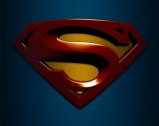 Because I had conscientiously avoided trailers and spoilers for the Superman Returns movie, I wasn't sure how the newest installment would mesh with the earlier movies or if it would even try. Certainly the Batman franchise has been completely reinvented in the movies at least twice. The movie picks up in modern times where the others left off, but after a long absence by Superman. The premise works and was updated a little. At least he doesn't look for a phone booth to change in. What would he do, change in front of a cell phone? The movie seemed to know there was a tremendous amount of history before it. For instance, Lex Luthor is suitably maniacal but he even seems to know he exists in a cliche, and milks it for what it is worth.
Because I had conscientiously avoided trailers and spoilers for the Superman Returns movie, I wasn't sure how the newest installment would mesh with the earlier movies or if it would even try. Certainly the Batman franchise has been completely reinvented in the movies at least twice. The movie picks up in modern times where the others left off, but after a long absence by Superman. The premise works and was updated a little. At least he doesn't look for a phone booth to change in. What would he do, change in front of a cell phone? The movie seemed to know there was a tremendous amount of history before it. For instance, Lex Luthor is suitably maniacal but he even seems to know he exists in a cliche, and milks it for what it is worth.In one scene, Superman performs a lifesaving rescue in Germany and the German speaking announcer calls him Zuperman. We turned to each other and said, "shouldn't that be Üœbermensch?" Or would that be a mistranslation? What were the writers thinking. He is a superhero, not soup!
The superman myth has collected a huge amount of science fiction arcana around it. I can't explain further without spoilers, but now I know why everyone was referring to the Larry Niven Essay, "Man of Steel, Woman of Kleenex" about Superman's prospects for love on this planet.
The german lauguage in the movie reminds me of another story, "Üœbermensch!" by Kim Neumann (Year's Best Science Fiction, 9th annual collection), where superman lands in the forests of Bavaria in Germany instead of the farmlands of Kansas and becomes Üœbermensch (with a secret identity, Curt Kessler) and helps the fascists fight against the enemies of fascism. It is written to be jarringly opposite the "Truth, Justice and the American Way" myth built up around an American landing. He ends his days in a war crimes prison a la Rudolf Hess. Perhaps upbringing makes all the difference for superherodom. Is it still called alternate history if you change history in a science fiction myth?
The greatness of the Superman myth lies in musing about what you would do with that power. Thomas Cahill in "Desire of the Everlasting Hills : The World Before and After Jesus" (Hinges of History) comments on two types of "supermen", Alexander the Great or Julius Caesar, and Jesus Christ. Our comic book hero Superman myth seems to combine the power of Caesar or Alexander with the sacrifice and sensibility of Jesus. perhaps it is exactly that which makes this myth so powerful.
tags: Superman, Üœbermensch, Science Fiction, Larry Niven, Kim Neumann, Superman Returns
No comments:
Post a Comment